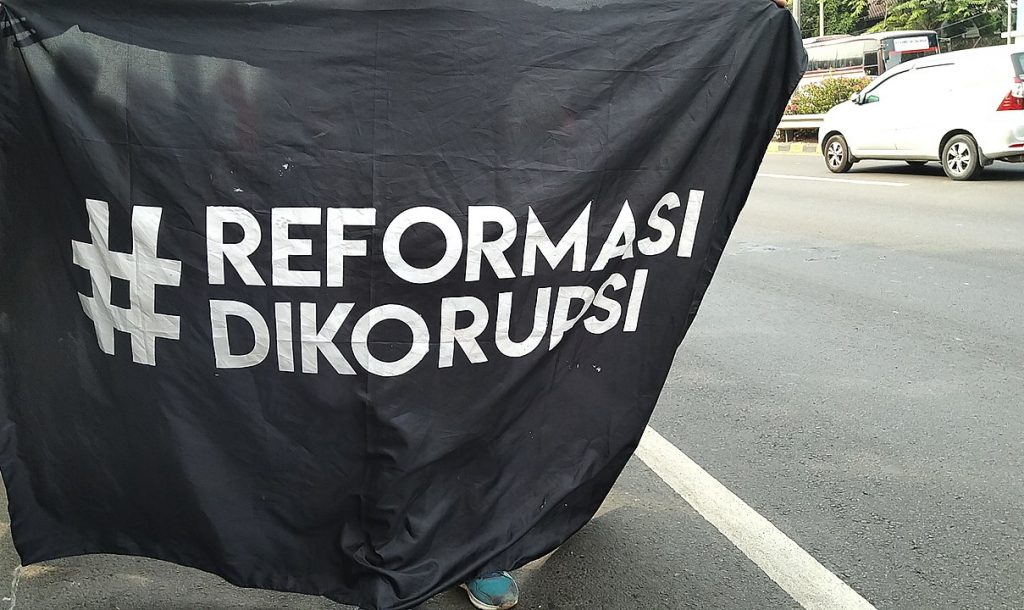After Indonesia transitioned to democracy in 1999, accountability reforms in parliament and bureaucracy were on the agenda. In 2002, Law 31/1999 on Criminal Acts of Corruption and Law 30/2002 established the Corruption Eradication Commission (Komisi Pemberantasan Korupsi, KPK) as an effort to solve the legacy of corruption from Suharto’s authoritarian era. Indonesia also reformed overlapping tasks of existing audit bodies, which were the state audit board (Badan Pemeriksa Keuangan, BPK), the financial and development audit agency (Badan Pengawas Keuangan dan Pembangunan, BPKP, and the internal audit body of local government and ministry (Inspektorat) through the Constitution Amendment 1999-2002. This accountability reform was intended to ensure that the three audit bodies could cooperate well in investigating the use of state budget by the parliament and the bureaucracy. But it has made uneven progress.
The BPK is the only state institution which has the authority to audit financial reports, performance, and conduct further investigations of suspected corruption in public and private organisations which receive funds from the state. The BPK’s investigation results are the only official indicator to assess whether a state institution performs well in its use of state funds. When conducting investigations, the BPK classifies its findings into four categories. First, if there is administrative error, the BPK will only recommend fixing the error. Second, if there are issues on budget planning, such as too many work trips, the BPK will recommend efficiency measures. Third, if there are irregular costs in infrastructure procurement, the BPK will order to funds be returned. Fourth, if there are fictitious programs or unreasonable mark-ups on state budgets, the BPK will classify it as corruption.
However, the accountability reform does not seem to be working. In 2014-2018 parliament consistently received higher scores than the bureaucracy in BPK’s financial audits. Meanwhile, Transparency International’s data shows that Indonesian corruption cases were higher in the parliament than in the bureaucracy. In 2014 the parliament contributed 89 percent of total corruption cases in Indonesia, while the bureaucracy contributed 79 percent. During 2014-2019, the KPK arrested 254 members of parliament due to corruption in use of state funds.
The accountability reform in 1999 only shifted the BPK’s vulnerability to the president, to vulnerability to parliament. Indonesia’s Constitution stipulates that members of BPK are chosen by parliament. The BPK is required to submit its investigation reports to the parliament in order to receive recommendation as to whether the report will be followed up by the judiciary. Meanwhile, the reform in 1999 shifted authority and power to conduct investigations toward the bureaucracy from the corrupt BPKP, which received many political interventions from Suharto’s administration, to BPK which was established as an independent body.
The arrangement creates a dysfunctional accountability mechanism. According to Bovens and Mulgan, accountability as a mechanism is an institutional arrangement or relation in which “actors are held to account by forums,” whereby the forum’s power and hierarchical status are higher than the actor. This assumes that a principal-agent relationship exists, in which “the forum is the principal and the actor is the agent who is held to account for his performance in office.” This type of accountability aims to ensure that state institutions stay on a virtuous path to accountable governance. In the Indonesian context, the arrangement places the BPK’s power and status (as the forum) lower than the parliament (as the actor). Meanwhile, the status and power of BPK (as the forum) is higher than the bureaucracy (as the actor).
The parliament controls BPK through the selection of the nine members. The term of office of each member is five years. The selection processes of BPK’s members in 2009, 2014 and 2019 have continuously been in the spotlight because the processes were not transparent in parliament and were subject to political interventions. Members of the BPK consist of former parliament members and non-politicians, but its composition is dominated by former politicians. Both former politicians and non-politicians need to have political accesses if they want to be the member of BPK. This political access leads to clientelism, which is a dominant practice in Indonesia. Scholars have shown that to occupy a public official position in Indonesia, people need to offer something, like funds and/or mass support, to a political party’s campaign in an election.
Paying bribes in Indonesia
A new survey looks beyond aggregated corruption indexes at how experiences of bribery and extortion in Indonesia differ from sector to sector.
This dysfunctional accountability mechanism really undermines accountability quality between BPK and the parliament. In 2013 the Hambalang project, a mega corruption case in Indonesia, exemplified this problem. The Hambalang project was supposed to build sport infrastructure for Indonesian athletes. This project was implemented from 2003 to 2012 and costed Rp 2.5 trillion (US$ 1 = Rp 14,278) and never finished. BPK investigated this case and found that corruption in this project reached Rp 463.67 billion and involved 15 parliamentarians. But, later due to the parliament’s control over the BPK, the names of the 15 politicians were lost from the BPK’s investigation report. Both the BPK and the parliament claimed that there was no mention of the 15 politicians in the report, even though the report with the names of 15 politicians had been published in the media. Many NGOs protested and challenged the disappearance of the 15 names from the BPK’s report but were ignored. This illustrates that the BPK can change its investigation report categories from a corruption category to non-violation category simply by erasing the suspects’ names.
Similarly, in 2016 the BPK conducted an annual investigation of all state institutions and found that the parliament had conducted fictitious work trips which reached Rp 945 billion. This case attracted a great deal of attention and protest from the public. But, because of the parliament’s intervention on the BPK, it moved its investigation report from the fictitious category to an administrative issue. BPK claimed that the parliamentary members who conducted the work trips had only failed to correctly report work trips. This shows that the BPK is able to move investigation results from the corruption category into the ordinary error category.
Conversely, accountability mechanisms which function between the BPK and the bureaucracy lead to audit processes which work well. In 2017 BPK conducted annual investigations into performance and financial reporting in Jambi Province. This investigation found fictitious work trips by the bureaucracy of up to Rp 100 million. The BPK ordered the bureaucracy to return Rp 100 million to the treasury.
Similarly, in 2020, a BKP audit found a corruption category breach in the bureaucracy of Seram Bagian Barat Regency, Maluku Province. This abuse reached Rp 70 billion of financing for the regency programs. This case was referred by the BPK to the Attorney to be processed.
In 2020 the BPK found violations of state budget for COVID-19 handling in South Sulawesi Province. The bureaucracy conducted unreasonable mark-up in the tenders for social assistance provision. The BPK has handed its investigation report to the judiciary to adjudicate this case. These cases show that BPK is consistent with its category findings.
These empirical cases show that the accountability mechanism which functions between BPK and the bureaucracy prevent illegal behaviour, and it can produce an objective finding category. Meanwhile, the dysfunctional accountability mechanism triggers illegal behaviour in BPK in order to secure the interests of the parliament. It is not surprising, then, that the parliament’s financial audit score from BPK is as high as the bureaucracy’s.
The future of Indonesia’s accountability performance much depends on how well the accountability mechanism works. The next accountability reform should fix this problem. If not, the reform will not lead to any meaningful improvements.
 Facebook
Facebook  Twitter
Twitter  Soundcloud
Soundcloud  Youtube
Youtube  Rss
Rss 



